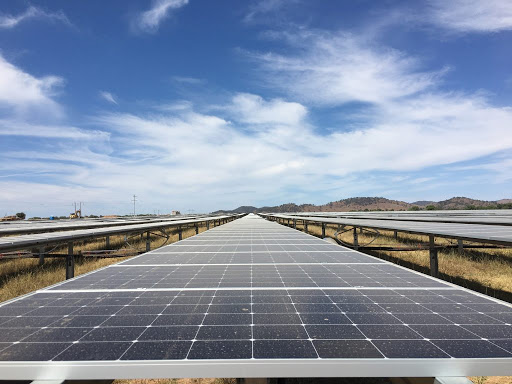Global S&T Development Trend Analysis Platform of Resources and Environment
| Miners ditching diesel seek to cut costs as well as emissions | |
| admin | |
| 2020-02-03 | |
| 发布年 | 2020 |
| 语种 | 英语 |
| 国家 | 国际 |
| 领域 | 地球科学 |
| 正文(英文) |  A new solar photovoltaic generation facility will be built at Fortescue’s Chichester Hub. Credit: Downer Group
Mining companies under investor pressure to curb carbon emissions are weaning themselves off the most polluting power sources, and see lower costs in using alternatives. Fortescue Metals Group Ltd. joined rivals including BHP Group and Anglo American Plc in flagging potential savings from new investments to switch mines to renewable energy as it expands a $700 million program to add transmission lines, solar arrays and battery storage in Australia’s Pilbara region. With energy accounting for as much as a fifth of a mine’s costs, less polluting options can often be cheaper than shipping diesel to remote locations.
“We are very keen to utilize more renewables,” Chief Executive Officer Elizabeth Gaines said in an interview. “We know it’s the right thing to do. We want to reduce our emissions, and we want to stay low cost.” The Perth-based iron ore producer will install a hybrid solar and gas supply to serve its Iron Bridge project rather than using diesel, adding to a deal signed last year to switch its Chichester Hub to renewable sources. BHP, the world’s top miner, estimates deals announced last year to switch two giant copper mines in Chile to solar, wind and hydro sources in place of existing coal and gas power will lower energy costs by about 20%. Anglo, which has installed a bank of solar panels floating on a copper mine’s waste pond, said in September renewable energy will help deliver cheaper mining operations. Miners can save as much as 25% of total electricity costs, and cut their electricity-related emissions in half by using solar, wind or batteries to power their sites, BloombergNEF analyst Sharon Mustri wrote in a December report. Fortescue’s Chichester program will reduce diesel consumption by 100 million liters, about 20% of the company’s current total, and when completed, the new energy investments will see solar account for as much as 30% of the supplier’s power consumption at mines and plants. Australia’s diesel imports have declined, falling about 16% in December compared with the same month a year earlier amid reduced demand, including from miners, according to data from Vortexa. About 7% less fuel was shipped to the country in 2019 compared with 2018. “There is a significant movement underway at remote mining operations to use more solar power and renewables,” said Gavin Wendt, senior resource analyst at Mine Life Pty in Sydney. “A lot of remote mine sites have used diesel and that’s become increasingly expensive.” Along with cutting use of diesel at processing plants or pits, miners and their equipment suppliers are examining opportunities to lower or eliminate consumption of the fuel in haul trucks and trains, Fortescue’s Gaines said in the Thursday interview. Suppliers are introducing battery or gas-power alternatives, while Fortescue is studying the potential to use hydrogen as a replacement fuel. “We’re kind of impatient to get to the position where we can further reduce our reliance on diesel throughout our entire fleet, but the technology is still evolving,” Gaines said. “I don’t think we’re alone in wanting to see that reliance on diesel reduce significantly.” (By David Stringer and Ann Koh) |
| URL | 查看原文 |
| 来源平台 | Minging.com |
| 文献类型 | 新闻 |
| 条目标识符 | http://119.78.100.173/C666/handle/2XK7JSWQ/226824 |
| 专题 | 地球科学 |
| 推荐引用方式 GB/T 7714 | admin. Miners ditching diesel seek to cut costs as well as emissions. 2020. |
| 条目包含的文件 | 条目无相关文件。 | |||||
| 个性服务 |
| 推荐该条目 |
| 保存到收藏夹 |
| 查看访问统计 |
| 导出为Endnote文件 |
| 谷歌学术 |
| 谷歌学术中相似的文章 |
| [admin]的文章 |
| 百度学术 |
| 百度学术中相似的文章 |
| [admin]的文章 |
| 必应学术 |
| 必应学术中相似的文章 |
| [admin]的文章 |
| 相关权益政策 |
| 暂无数据 |
| 收藏/分享 |
除非特别说明,本系统中所有内容都受版权保护,并保留所有权利。
修改评论